Wales v South Africa: Springboks highlight hosts' weaknesses
- Published
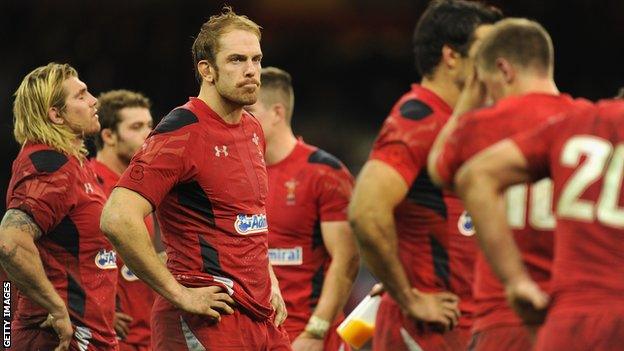
Alun Wyn-Jones
This is November, so the post-match rhetoric is frustratingly familiar in Wales, especially when the big boys are in town. Fine margins. Lots of positives. Not too far away.
Saturday's 24-15 loss to the Springboks was coach Warren Gatland's 21st defeat in 22 Tests against South Africa, New Zealand and Australia.
A depressing statistic for a country that has won three Six Nations titles and reached a World Cup semi-final during his six years in charge.
If Wales' inadequacies at the highest level remain, there is no shame in losing to the second best team in the world.
The Springboks have raised their own game with a more expansive approach. Despite not hitting the heights they have scaled of late, they were good value for their victory in Cardiff.
Three tries to nil suggests a one-sided encounter, but despite the two quick-fire scores in six minutes that put South Africa 17-6 up inside the first quarter, it was never that.
Wales suffered considerable misfortune, losing three players to injury in the first half-hour, but remained competitive throughout, without ever seriously threatening to go on and win the match.
They edged possession and territory, made more metres, more line breaks, carried the ball more, missed fewer tackles and conceded fewer penalties. More significantly, though, Wales turned over ball on 19 occasions, stymying the rhythm and momentum they found in patches.
So what prevents the back-to-back Six Nations champions taking that elusive 'next step' and actually beating one of the top sides in the world?
For Gatland, the issue is not about size, or skill, or power, or fitness. Wales have shown they have those in abundance, particularly against England in this year's Six Nations decider.
But that was six months ago. Slipping into top gear - particularly mentally - seems to take time, simply because most Welsh players are not used to finding it outside the Test arena.
"South Africa and the other southern hemisphere teams get to play at that level all the time, whether it is the [Rugby] Championship or Super Rugby," Gatland observed. "We get maybe four or five chances a year to play at that level.
"When you are playing at that tempo and speed of thought, it sometimes takes a little bit of time to adjust and get used to it. For me, that is the big advantage the southern hemisphere has because for us, coming out of club or regional rugby, the difference for the players is just chalk and cheese."
You can see his point. The last competitive action for South Africa's players may have been five weeks ago, but it came against the All Blacks in a pulsating Rugby Championship finale in Johannesburg.
The bulk of Wales' players came into camp on the back of Pro 12 matches against the likes of Italian side Zebre and Newport Gwent Dragons, traditionally the weakest region.
South Africa's superior speed of thought at critical moments, and experience in seizing them, was much in evidence and pivotal to the outcome.
Take the opening try. With Wales centre Scott Williams down receiving treatment, the Springboks spotted their opponents were a man down in defence and exploited it ruthlessly.
The absence of Williams in the line provided the electric Bryan Habana an inviting mis-match with Wales hooker Richard Hibbard, whose qualities - many of which he brought to bear on this match - do not include lightning pace.
Once beyond the first line of defence, Habana patiently waited for the supporting Bismarck Du Plessis before timing his pass perfectly. The hooker also showed admirable composure, his captain having let him know he was up in support. Even though the final pass was slightly behind him, the consistently impressive Jean De Villiers took his 25th Test try with aplomb.
An inability to cope with South Africa's powerful driving maul - Gatland later pondered if his side had done enough preparatory work in that facet of play - was evident in the second try.
But it was another momentary lapse in concentration and cogent decision-making that ultimately took the game away from Wales.
South Africa's winning try stemmed from a towering kick from replacement Wille Le Roux that almost went straight up into the air. James Hook failed to claim it, but Wales were slow to react to the danger.
Two more of South Africa's returning old guard, Fourie Du Preez and Jaque Fourie, were alive to the possibilities, however. Rhys Priestland, covering across, dithered momentarily as he allowed Du Preez's kick to bounce, giving Fourie time to steal in and send Du Preez away with the winning play.
The officials might not have spotted that Fourie started his chase from an offside position, but Gatland was frustrated none of his own players had seen fit to point it out to referee Alain Rolland.
"Maybe if we had been a bit quicker we could have asked the referee to go to the TMO to check everything was OK," he observed. "At 15-17, rather than it being a try to them under the posts, it could have been a penalty to us on halfway. Those are big moments in the game."
All of which leaves Wales playing their annual game of catch-up, it seems. Evidence suggests they play better the longer they are together, so they may well go on to achieve the three wins out of four Gatland believes would now represent a "reasonably satisfying" autumn.
Argentina - who won in Cardiff 12 months ago - are next up, and Wales will have to do without Jonathan Davies, and possibly Adam Jones as well, after they picked up injuries in the Springboks defeat. Tonga and recent nemesis Australia follow.
"Every autumn we want to play the best teams in the world because that is what prepares us," Gatland added. "But ironically it is almost like pre-season for us, getting ready for the Six Nations.
"We don't want it to be like that, we want to hit the ground running and be good enough to beat these sides."
Getting up to speed physically is one thing. Getting minds attuned to Test-match intensity is clearly another.
- Published9 November 2013
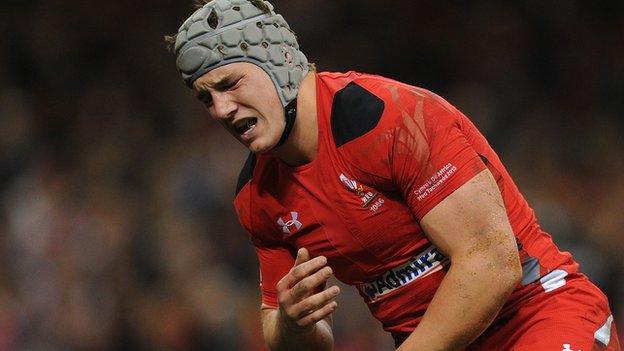
- Published9 November 2013
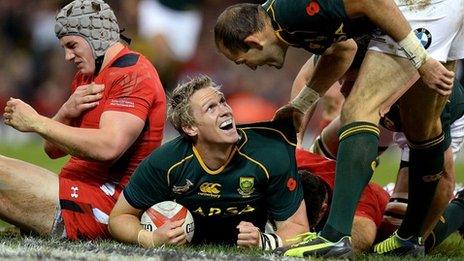
- Published9 November 2013
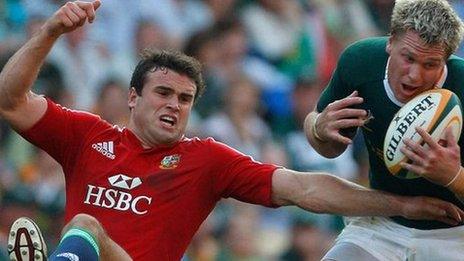
- Published7 November 2013
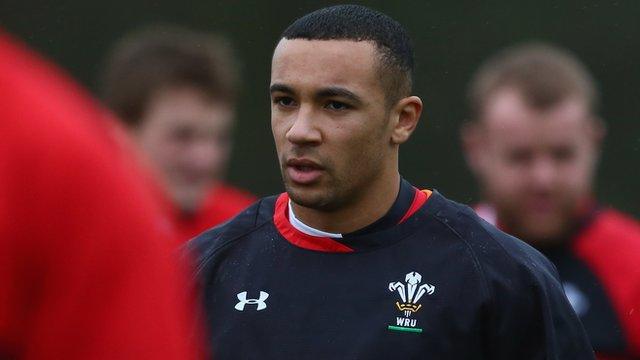
- Published14 September 2016

- Published15 February 2019
